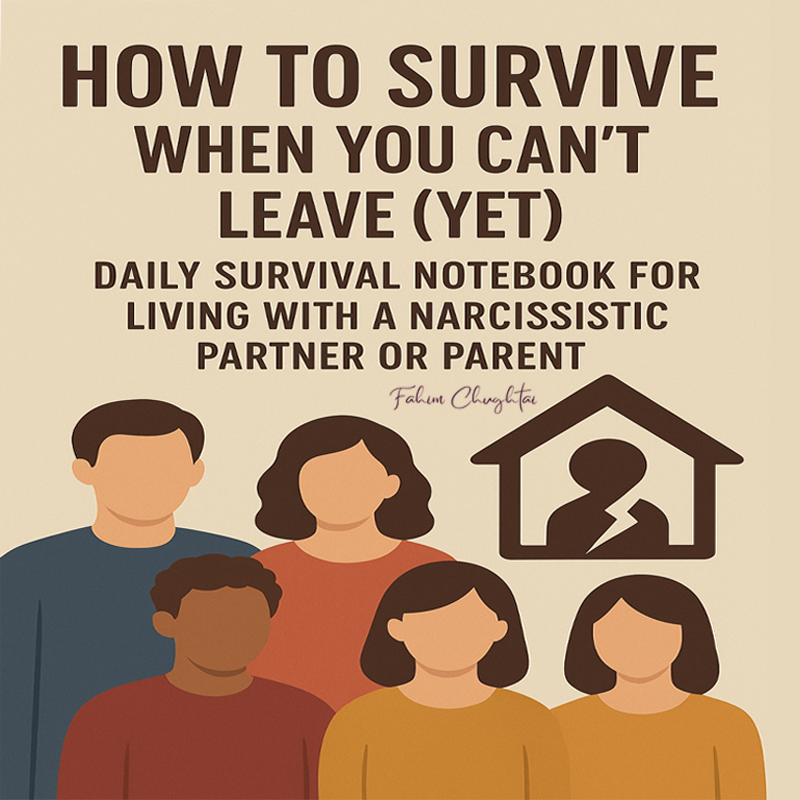If you’re questioning whether your relationship with your mother feels “off” but can’t pinpoint why, you’re not alone. Daughters of covert narcissistic mothers often struggle for years trying to understand the subtle manipulation, guilt trips, and emotional control that define their upbringing. Unlike overt narcissists who are openly self-centered, covert narcissistic mothers operate through passive-aggression, victim-playing, and hidden manipulation that leaves their daughters confused and questioning their own reality.
- Understanding Covert Narcissistic Mothers vs. Overt Narcissists
- 12 Hidden Signs You’re a Daughter of a Covert Narcissistic Mother
- The Science Behind These Patterns
- Breaking Free: Your Path to Recovery
- The Importance of Professional Guidance
- Resources for Continued Healing
- Frequently Asked Questions
- Conclusion: Your Journey to Freedom Begins Now
The effects run deep – from people-pleasing tendencies and difficulty setting boundaries to chronic self-doubt and relationship struggles. These patterns aren’t your fault; they’re the result of growing up with a mother who prioritized her emotional needs over your healthy development.
Understanding Covert Narcissistic Mothers vs. Overt Narcissists
Before exploring the signs affecting daughters, it’s crucial to understand what sets covert narcissistic mothers apart. While overt narcissists are obviously self-centered and attention-seeking, covert narcissistic mothers present as selfless, victimized, and nurturing on the surface. This makes their manipulation incredibly difficult to identify and even harder to address.
Covert narcissistic mothers use subtle tactics like guilt-tripping, passive-aggression, and emotional manipulation disguised as concern or love. They often present themselves as martyrs who sacrifice everything for their children, making it nearly impossible for daughters to recognize the abuse or speak up about it without appearing ungrateful.
Am I Dealing With a Covert Narcissist — or Just Toxic Behavior?
12 Hidden Signs You’re a Daughter of a Covert Narcissistic Mother
1. You’re Trapped in Chronic People-Pleasing Patterns
Daughters of covert narcissistic mothers develop an overwhelming need to please everyone around them. This isn’t just being nice – it’s a survival mechanism learned from constantly trying to manage your mother’s emotions and avoid her passive-aggressive responses.
You likely find yourself saying yes when you want to say no, apologizing for things that aren’t your fault, and going to extreme lengths to avoid conflict. This people-pleasing extends into your romantic relationships, friendships, and workplace dynamics, often leading to burnout and resentment.
The root of this behavior lies in your childhood conditioning where your mother’s happiness became your responsibility. You learned that your worth depended on keeping others satisfied, a pattern that continues to control your adult relationships.
2. Setting Boundaries Feels Impossible or Wrong
One of the most damaging effects covert narcissistic mothers have on their daughters is the inability to establish healthy boundaries. Your mother likely violated your physical, emotional, and psychological boundaries regularly while making it seem like she was being caring or involved.
When you attempt to set boundaries now, you probably experience intense guilt, fear, or the feeling that you’re being “mean” or “ungrateful.” This is because boundary-setting was systematically discouraged throughout your childhood through guilt trips, silent treatment, or emotional manipulation.
Your mother may have made comments like “After everything I’ve done for you” or “I just want what’s best for you” whenever you tried to assert independence, leaving you feeling guilty for having normal developmental needs.
3. You Experience Chronic Self-Doubt and Reality Questioning
Gaslighting is a primary tool of covert narcissistic mothers, though it’s so subtle that daughters often don’t recognize it. You might find yourself constantly second-guessing your memories, perceptions, and emotions because your mother regularly dismissed or reframed your experiences.
When you expressed hurt or disappointment, your mother likely responded with phrases like “You’re being too sensitive,” “That’s not what happened,” or “You’re overreacting.” Over time, this systematic invalidation taught you to distrust your own judgment and rely on others to validate your reality.
This self-doubt extends into every area of your life, making decision-making difficult and leaving you vulnerable to manipulation by others who recognize your uncertainty.
4. You Struggle with Perfectionism and Never Feeling “Good Enough”
Covert narcissistic mothers often appear supportive while simultaneously being relentlessly critical. They find subtle ways to point out your flaws or suggest improvements, often disguised as helpful advice or concern for your well-being.
You may have heard comments like “I just think you could do better” or received backhanded compliments that left you feeling worse about yourself. This constant criticism, delivered with a smile, created an internal belief that you must be perfect to be worthy of love and acceptance.
As an adult, you likely struggle with impostor syndrome, have difficulty celebrating your achievements, and set impossibly high standards for yourself that leave you feeling perpetually inadequate.
5. You Feel Responsible for Everyone’s Emotions
Growing up with a covert narcissistic mother means you learned to be hypervigilant about other people’s moods and emotions. Your mother likely used you as her emotional dumping ground, sharing inappropriate details about her life while expecting you to comfort and support her.
This emotional parentification taught you that managing other people’s feelings is your job. You probably find yourself constantly reading the room, adjusting your behavior to keep others happy, and feeling responsible when someone else is upset – even when their emotions have nothing to do with you.
This emotional hypervigilance is exhausting and prevents you from developing a healthy sense of self separate from others’ emotional states.
6. You Experience Identity Confusion and Difficulty Knowing What You Want
Covert narcissistic mothers often live vicariously through their daughters, subtly directing their choices while appearing to be supportive. You may have been encouraged to pursue activities, careers, or relationships that reflected well on your mother rather than activities that genuinely interested you.
This enmeshment creates confusion about where your mother’s desires end and your authentic self begins. You might struggle to identify your own preferences, values, and goals because you’ve been conditioned to prioritize what would make your mother proud or what would maintain family harmony.
Many daughters of covert narcissistic mothers report feeling like they’re living someone else’s life or going through the motions without genuine passion or purpose.
7. You Attract and Stay in Unhealthy Relationships
The dynamics you learned with your covert narcissistic mother create a blueprint for future relationships. You’re likely drawn to partners who need “fixing” or who display similar manipulative behaviors because this feels familiar and comfortable.
You may find yourself repeatedly in relationships where you’re giving more than you’re receiving, making excuses for your partner’s behavior, or staying in situations that leave you feeling drained and unappreciated. The pattern of trying to earn love through service and accommodation becomes your default relationship style.
Additionally, you might struggle to recognize red flags early in relationships because manipulation tactics feel normal rather than alarming.
8. You Have Difficulty Trusting Your Own Emotions
Covert narcissistic mothers excel at emotional manipulation, teaching their daughters that their feelings are either wrong, too intense, or unimportant. You learned to suppress or minimize your emotions to maintain family peace and avoid your mother’s passive-aggressive responses.
As an adult, you might find yourself questioning whether your emotional reactions are appropriate, asking others how you should feel about situations, or numbing your emotions entirely. This disconnection from your emotional guidance system makes it difficult to make authentic decisions or recognize when you’re being mistreated.
You may also struggle with expressing anger, viewing it as dangerous or inappropriate because showing anger toward your mother resulted in guilt trips or punishment.
9. You Experience Chronic Guilt and Shame
Guilt is the primary emotion that covert narcissistic mothers use to control their daughters. Through subtle comments, martyrdom, and emotional manipulation, these mothers ensure their daughters feel perpetually guilty for having normal needs, desires, or boundaries.
You likely experience guilt for spending time away from your mother, making decisions she doesn’t approve of, or simply living your own life. This guilt is often accompanied by shame – a deeper feeling that something is fundamentally wrong with you for wanting independence or having different opinions than your mother.
This chronic guilt and shame can lead to depression, anxiety, and a persistent feeling that you’re somehow failing or disappointing others, even when you’re doing nothing wrong.
10. You Struggle with Financial Boundaries and Independence
Many covert narcissistic mothers use financial support or gifts as tools of control and manipulation. They may offer help with strings attached, use money to maintain involvement in your adult decisions, or create financial dependence that keeps you emotionally connected.
You might find yourself feeling obligated to accept your mother’s financial help even when it comes with unwanted advice or interference. Alternatively, you may go to extremes to avoid any financial assistance because you’ve learned it always comes with a price.
This dynamic can create ongoing financial stress and difficulty making independent financial decisions without considering how your mother will react or what she might offer or withdraw.
11. You Have Trouble Enjoying Success and Receiving Praise
Daughters of covert narcissistic mothers often struggle to fully embrace their achievements because they’ve been conditioned to believe their successes somehow diminish or threaten their mother. Your mother may have appropriated your achievements (“I’m so proud of what we accomplished”) or undermined them with subtle criticisms or backhanded compliments.
When you receive genuine praise or recognition, you might feel uncomfortable, undeserving, or worried that celebrating will somehow hurt someone else. This inability to fully own your successes can limit your potential and prevent you from pursuing opportunities that might lead to greater achievements.
You may also find yourself downplaying your accomplishments or immediately shifting focus to areas where you could improve, unable to sit with positive feelings about yourself.
12. You Feel Like You’re “Walking on Eggshells” Around Your Mother
The relationship with your covert narcissistic mother likely feels unpredictable and tense, even during seemingly pleasant interactions. You’ve learned to carefully monitor her moods and adjust your behavior accordingly to avoid triggering her passive-aggressive responses or victim behavior.
You might find yourself editing your words, avoiding certain topics, or feeling anxious before phone calls or visits with your mother. This hypervigilance is exhausting and prevents you from having authentic, relaxed interactions with her.
Even positive conversations can feel stressful because you’re constantly assessing whether you’re saying the right thing or whether she’s storing up ammunition for future guilt trips or manipulation.
The Science Behind These Patterns
Understanding why these patterns develop helps daughters of covert narcissistic mothers realize their struggles aren’t personal failings but predictable responses to psychological manipulation. Research shows that children who grow up with narcissistic parents often develop complex trauma, also known as developmental trauma.
This type of trauma affects brain development, particularly in areas responsible for emotional regulation, self-esteem, and relationship formation. The constant stress of managing a narcissistic parent’s emotions triggers the development of hypervigilance and people-pleasing as survival mechanisms.
Additionally, the intermittent reinforcement pattern common in narcissistic parenting – occasional love and approval mixed with criticism and manipulation – creates trauma bonds that are incredibly difficult to break. This explains why many daughters continue hoping for their mother’s approval despite repeated disappointment.
Breaking Free: Your Path to Recovery
Recognizing these patterns is the first step toward healing, but recovery requires intentional work and often professional support. Many daughters of covert narcissistic mothers benefit from therapy specifically focused on narcissistic abuse recovery, as traditional therapy approaches may not adequately address the unique challenges of covert manipulation.
If you’re ready to begin your healing journey, consider these essential steps:
Validate Your Experience: Your feelings and perceptions are valid, even if they’ve been consistently dismissed or minimized. Trust your instincts about your relationship with your mother.
Learn About Narcissistic Abuse: Education about covert narcissism and its effects helps you understand that your struggles are normal responses to abnormal treatment.
Practice Setting Small Boundaries: Start with low-stakes situations to build your boundary-setting skills before addressing major issues with your mother.
Develop Your Support System: Connect with others who understand narcissistic abuse, whether through support groups, online communities, or professional counseling.
Focus on Reconnecting with Yourself: Spend time identifying your own preferences, values, and goals separate from what others expect of you.
For those seeking comprehensive support, professional analysis can provide clarity about your specific situation and personalized strategies for moving forward. Understanding the exact type of narcissistic abuse you’ve experienced and its impact on your life creates a roadmap for targeted healing.
The Importance of Professional Guidance
While self-help resources are valuable, the complex nature of covert narcissistic abuse often requires professional insight to fully understand and address. Many daughters spend years in therapy without making significant progress because their therapists don’t understand the specific dynamics of narcissistic family systems.
A specialized assessment can help identify the particular patterns affecting your life and provide strategies tailored to your situation. This type of analysis looks beyond surface symptoms to understand the root causes of your struggles and creates a clear path forward.
Consider seeking professional evaluation if you recognize multiple signs in your own experience and want specific guidance for your recovery journey. Expert analysis can validate your experiences while providing practical tools for breaking free from lifelong patterns.
Resources for Continued Healing
Recovery from the effects of having a covert narcissistic mother is a process that requires ongoing support and tools. In addition to professional therapy, many daughters find structured recovery programs helpful for addressing specific aspects of their healing.
Still Living With Them? You’re Not Helpless.

For those dealing with trauma bonds – the psychological attachment that keeps you connected to your mother despite the pain she causes – specialized workbooks and exercises can provide day-by-day guidance for breaking these powerful connections. These resources often include techniques for managing withdrawal-like symptoms that occur when limiting contact with narcissistic family members.
Additionally, daughters who are unable to immediately cut contact with their narcissistic mothers benefit from strategies specifically designed for surviving these ongoing relationships while protecting their mental health. Learning how to navigate family gatherings, phone calls, and other interactions without losing yourself in the process is crucial for many women.
You’ve Seen the Patterns. Now Break the Bond.
Frequently Asked Questions
Q: How do I know if my mother is truly a covert narcissist or just difficult?
A: The key difference lies in the consistent pattern of manipulation, lack of empathy, and the impact on your mental health. Covert narcissistic mothers leave their daughters with specific symptoms like chronic self-doubt, people-pleasing, and difficulty with boundaries. If you recognize multiple signs and feel emotionally drained after interactions with your mother, professional evaluation can help clarify your situation.
Q: Can covert narcissistic mothers change with age or therapy?
A: Unfortunately, narcissistic personality patterns are deeply ingrained and rarely change, even with therapy. Covert narcissists often use therapy as another way to appear like victims or to gather ammunition for future manipulation. Focus your energy on changing your responses to her behavior rather than trying to change her.
Q: Is it normal to feel guilty about recognizing these patterns in my mother?
A: Absolutely. Guilt is one of the primary tools covert narcissistic mothers use to maintain control. Feeling guilty about recognizing abuse is actually a sign that the conditioning worked effectively. This guilt will decrease as you continue your healing journey and develop stronger boundaries.
Q: How do I protect my own children from my narcissistic mother?
A: Setting clear boundaries about your mother’s access to your children is essential. Limit unsupervised time, prepare your children for her behavior, and consider supervised visits only. Many daughters find that having children gives them the motivation they need to finally establish firm boundaries with their narcissistic mothers.
Q: Should I go no-contact with my covert narcissistic mother?
A: This is a deeply personal decision that depends on your specific situation and mental health needs. Some daughters benefit from no-contact, while others choose limited contact with strong boundaries. Consider your safety, mental health, and life circumstances when making this decision, preferably with professional guidance.
Q: Why do I still crave my mother’s approval despite knowing she’s narcissistic?
A: This is completely normal and reflects the power of trauma bonding. Children are biologically programmed to seek their parent’s love and approval. Breaking these bonds takes time and often requires professional support to process the grief of accepting that your mother cannot provide the love you deserve.
Conclusion: Your Journey to Freedom Begins Now
Recognizing yourself as a daughter of a covert narcissistic mother is both validating and overwhelming. The patterns you’ve experienced aren’t your fault, and the struggles you face are normal responses to psychological manipulation that began in childhood.
While the road to recovery requires time and commitment, thousands of daughters have successfully broken free from these destructive patterns to build fulfilling, authentic lives. Your awareness is the first step toward reclaiming your power and developing the healthy relationships you deserve.
Remember that healing isn’t linear, and setbacks are part of the process. Be patient with yourself as you learn to trust your own perceptions, set boundaries, and develop your authentic identity separate from your mother’s expectations and manipulation.
Your life belongs to you, not to managing your mother’s emotions or meeting her needs. With the right support and tools, you can break free from the patterns that have held you back and create the life you truly want – one built on your own values, desires, and authentic self rather than the fear of disappointing someone who was never capable of truly loving you in the first place.






